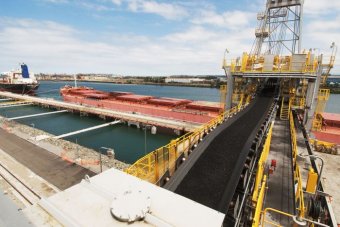Trade surplus slumps to $1.3b in shock result
Updated
Australia's trade surplus has dramatically shrunk by almost two-thirds, just a day after surging exports helped keep the nation out of recession.
Key points:
- January trade surplus of $1.3b, down 61pc on December's $3.3b
- Exports down 3pc, imports jump 4pc
- Consumer goods exports up 7pc, gas exports rise 8th straight month
Bureau of Statistics figures show Australia exported around $1.3 billion worth of goods and services more than it imported in January.
Ordinarily, that would be an excellent performance, with Australia having generally been in the business of spending more than it earns for the past few decades.
However, the nation sprang to a record trade surplus of $3.5 billion in December on a massive rebound in commodity prices and an increase in the volume of resources being exported.
Economists had expected this performance to be repeated, and then some, the following month, typically predicting a surplus of $3.8 billion, with one analysts predicting a $5 billion positive trade balance.
They were sorely disappointed, though, not only by the weaker-than-expected January figure, but also by a downward revision to December's record breaker, taking it back to $3.3 billion.
Westpac's Andrew Hanlan said it is an early warning that net exports may not continue adding much to GDP growth in the current quarter, after the December quarter economic surge.
"This is a disappointing start to the March quarter, pointing to the risk of some downside to real net exports for the quarter," he wrote in a note.
Imports surge on consumer spending spree
If there was good news in such a disappointing figure, it was that a surge in imports played a large role in lowering the surplus.
In particular, consumer goods imports jumped 7 per cent, or $543 million, over the month, perhaps as retailers restocked from what appears to have been a good Christmas sales period for many.
"We would highlight the recovery in consumption imports, particularly household electrical items, transport equipment and food and beverages," Citi's economists wrote in a note.
Imports of capital goods - basically various business equipment - also rose 3 per cent, perhaps indicating that companies are starting to invest in expanding output.
There was also some reasonable news hidden within what would normally be a very disappointing 3 per cent fall in exports.
Two-thirds of the decline was due to a 39 per cent fall in non-monetary gold exports, which are notoriously volatile month-to-month and therefore likely to rebound.
Coal exports also fell by $400 million, due to a decline in volumes.
However, Citi said there was some good news in the commodities sector.
"The quiet achiever in the data was gas exports," the bank's economists wrote.
"These have risen for eight consecutive months and should rise further in the medium term.
"This will support GDP growth and according to the RBA will add around 0.5 percentage points to yearly growth each year in 2017 and 2018."
Topics: trade, economic-trends, australia
First posted









